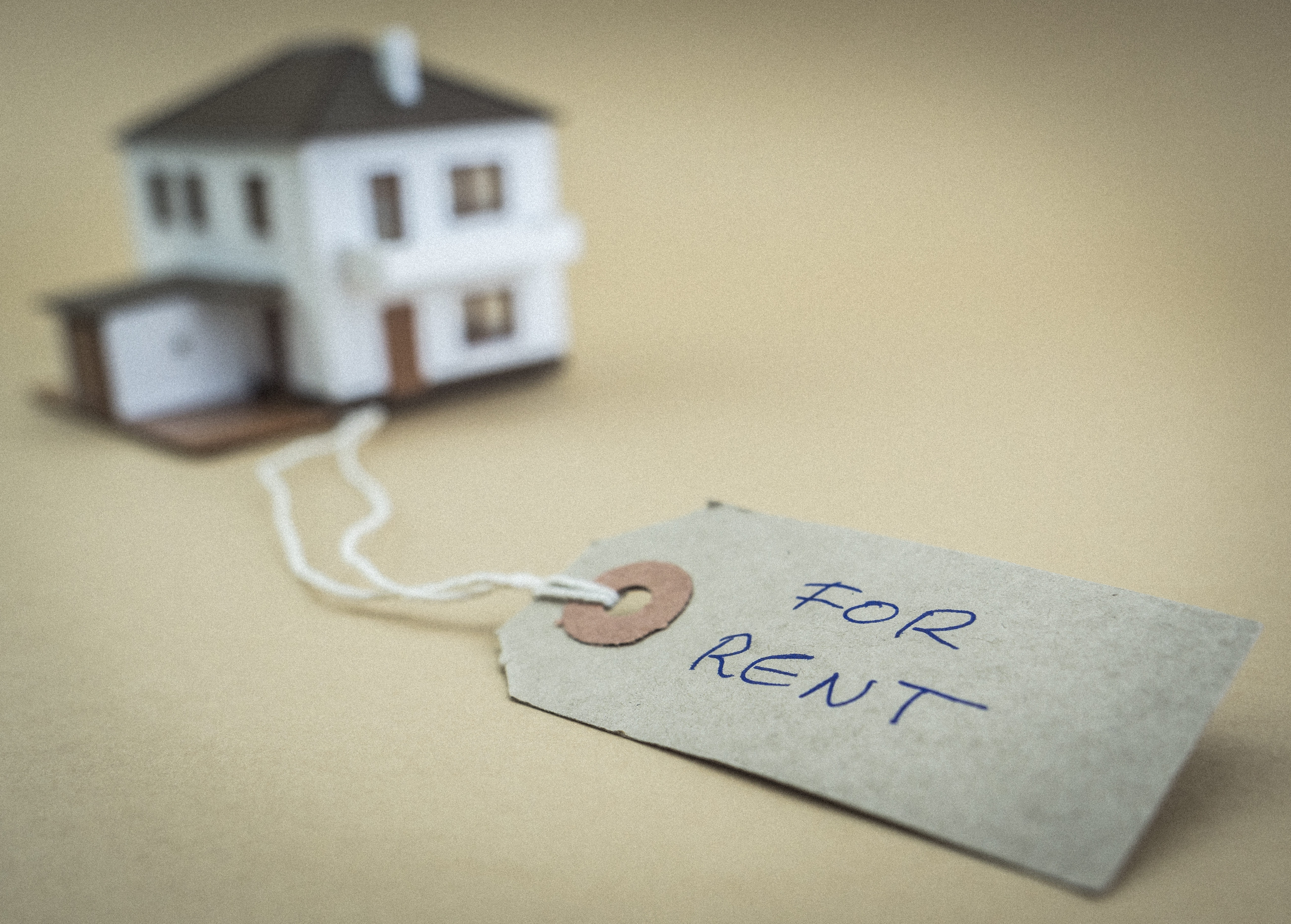If you’re a landlord running your rental properties as a sole proprietorship, keeping your money organized is key. Mixing rental income with your personal account can make taxes messy, bookkeeping confusing, and your financial life stressful.
In this guide, we’ll cover how to open a business bank account as a sole proprietor landlord, including what documents you need and the best bank options (traditional and digital).
Key takeaways
- A sole proprietorship business bank account keeps rental income separate from personal money and makes finances easier to manage.
- While not legally required, a dedicated account for sole proprietorship simplifies Schedule E reporting and reduces tax-time confusion.
- You can open a bank account using your ID, SSN, or EIN, and business information.
- Baselane, an all-in-one digital banking platform, helps you organize funds through proper-level accounts and automated bookkeeping.
Why sole proprietor landlords need a separate business bank account
As a sole proprietor landlord, your rental business and personal finances are legally tied to you. A sole proprietorship business bank account is essential for various reasons.
- It keeps rental and personal income divided, so you always know what belongs to the business and what doesn’t.
- It makes Schedule E reporting easier because all rental income and expenses flow through one dedicated account.
- It reduces tax and audit risk, since commingling personal and rental funds is one of the most common mistakes you can make.
- It saves hours of bookkeeping as you get a clear record of rental property expenses.
- It gives you clear visibility into cash flow, helping you assess your properties’ financial state.
- It sets you up to scale responsibly, whether that means adding more properties or managing multiple units under one sole proprietorship.
What you need to open a sole proprietor bank account
Before opening your account, gather your documents. Here are the key sole proprietorship bank account requirements:
Banking options for sole proprietor landlords
There are two main ways to open a business bank account: a traditional bank or a digital, online banking platform. Both work, but they are built for very different needs
Traditional banks
Traditional banks are often the first choice for many sole proprietor landlords as they offer a smooth transition from personal to business account and offer in-person support. Some of the most common banks you can choose from include Chase, Bank of America, Wells Fargo, and Citi.
Traditional banks can work well when:
- You prefer in-person support
- You already have a long banking relationship
- You don’t mind monthly fees or minimum balances
Where traditional banks fall short for sole proprietor landlords is in day-to-day property management; these accounts are designed for general businesses, not rentals. Tracking income across multiple properties often means using one account and manually sorting transactions. Rent collection, security deposits, and bookkeeping all happen outside the bank, usually in spreadsheets or accounting software.
Online banking platforms
Digital platforms include real-estate-focused platforms and digital banking solutions. Baselane, for example, offers real specific banking needs, while Relay, Novo, and Bluevine offer generic banking best suited for small businesses.
Compared to traditional banks, landlord digital banking platforms focus on:
- Easy and quick online setup
- High APYs and the option to open several checking and savings accounts
- Integration with bookkeeping software (Baselane offers automated, integrated bookkeeping)
Instead of forcing you to adapt your workflow to the bank, these platforms help you build a better account tracking system at the property or unit level. This is why many landlords open a sole proprietor checking account at a traditional bank and later switch to a digital platform as their portfolio grows.
What to look for in a banking platform as a sole proprietor landlord
Not every business bank account is well-suited to rental income. When opening a bank account for a sole proprietorship, focus on the platform’s features that reduce manual work and keep your finances organized.
Here’s what to look for:
- Clear separation of rental finances, either through sub-accounts or property-level tracking.
- Low or no monthly fees, since banking costs should not eat into rental income.
- Built-in rent collection, including ACH payments and payment records.
- Support for security deposits, so tenant funds stay organized.
- Built-in bookkeeping or accounting integrations, especially for Schedule E reporting.
- Strong mobile and online access, since most landlords manage finances remotely.
- Scalability, so the account still works as more properties are added.
How to open a bank account for sole proprietor landlords with Baselane
Here’s a quick walkthrough of setting up a bank account for a sole proprietorship using Baselane.
- Sign up for a free Baselane account using your email address. Once you’re logged in, click on ‘Open a landlord bank account’.
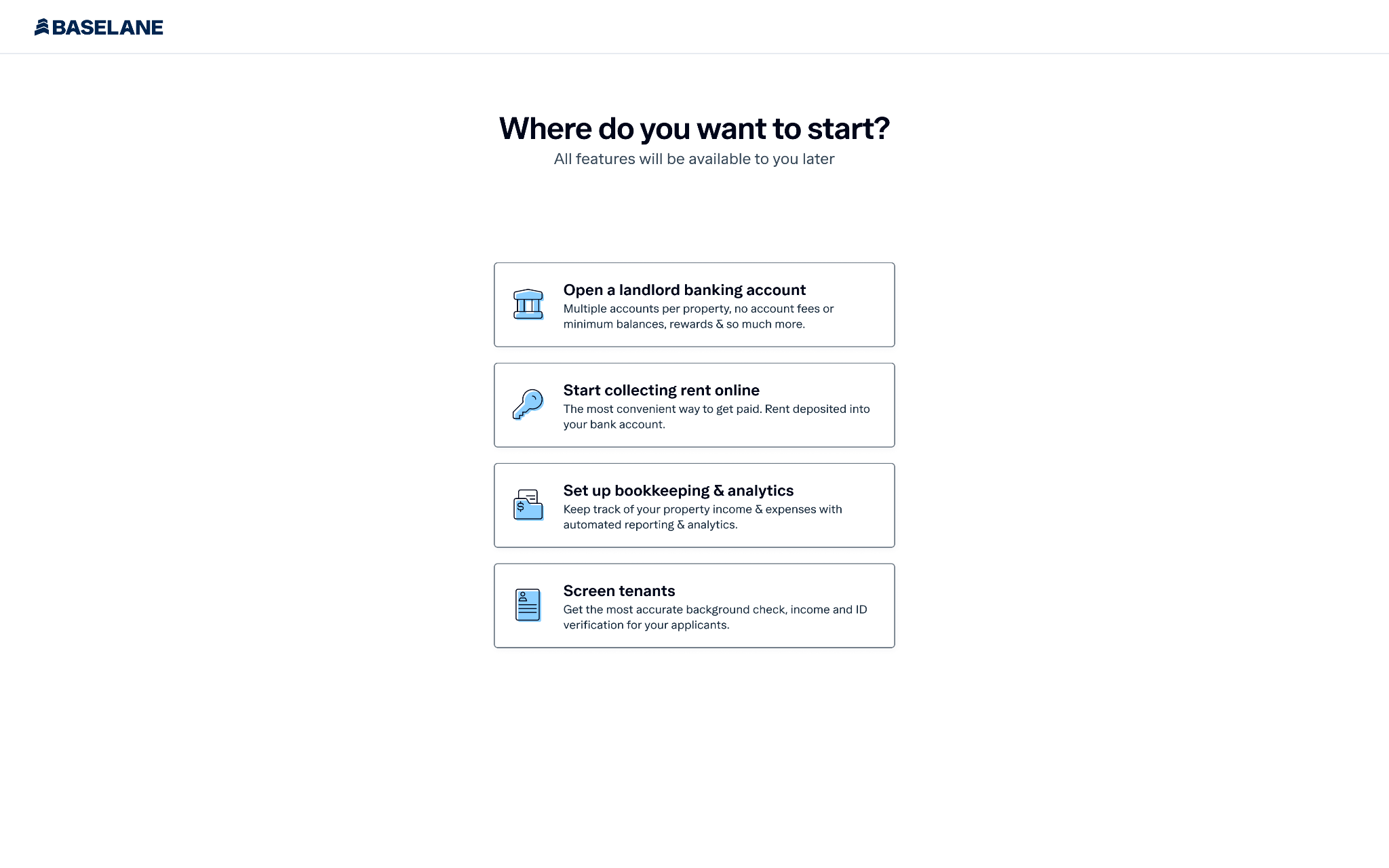
- Choose sole proprietorship as your business entity.
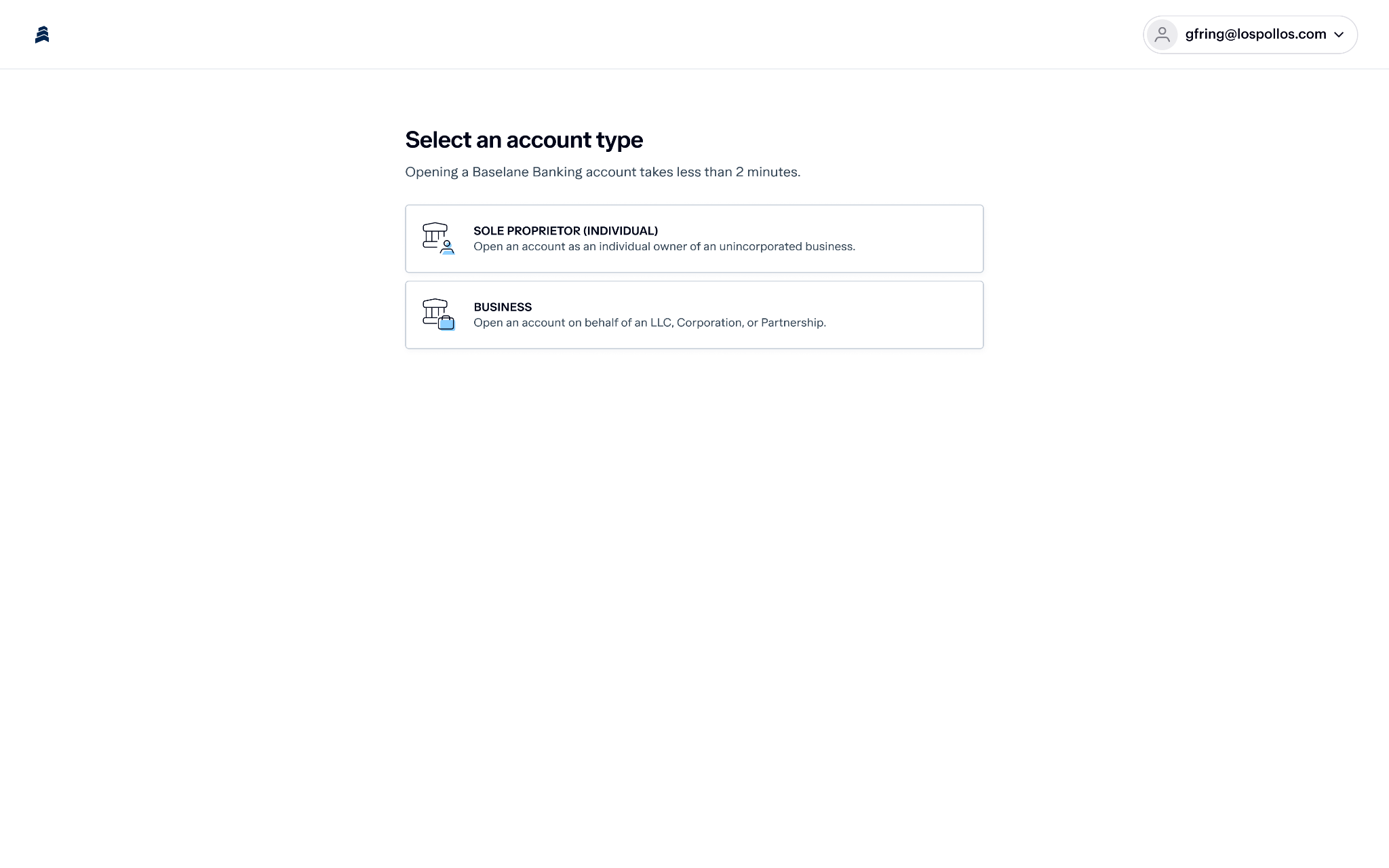
- Then, add the details–your first and last name, DOB, physical address, business information, and Social Security Number (SSN).
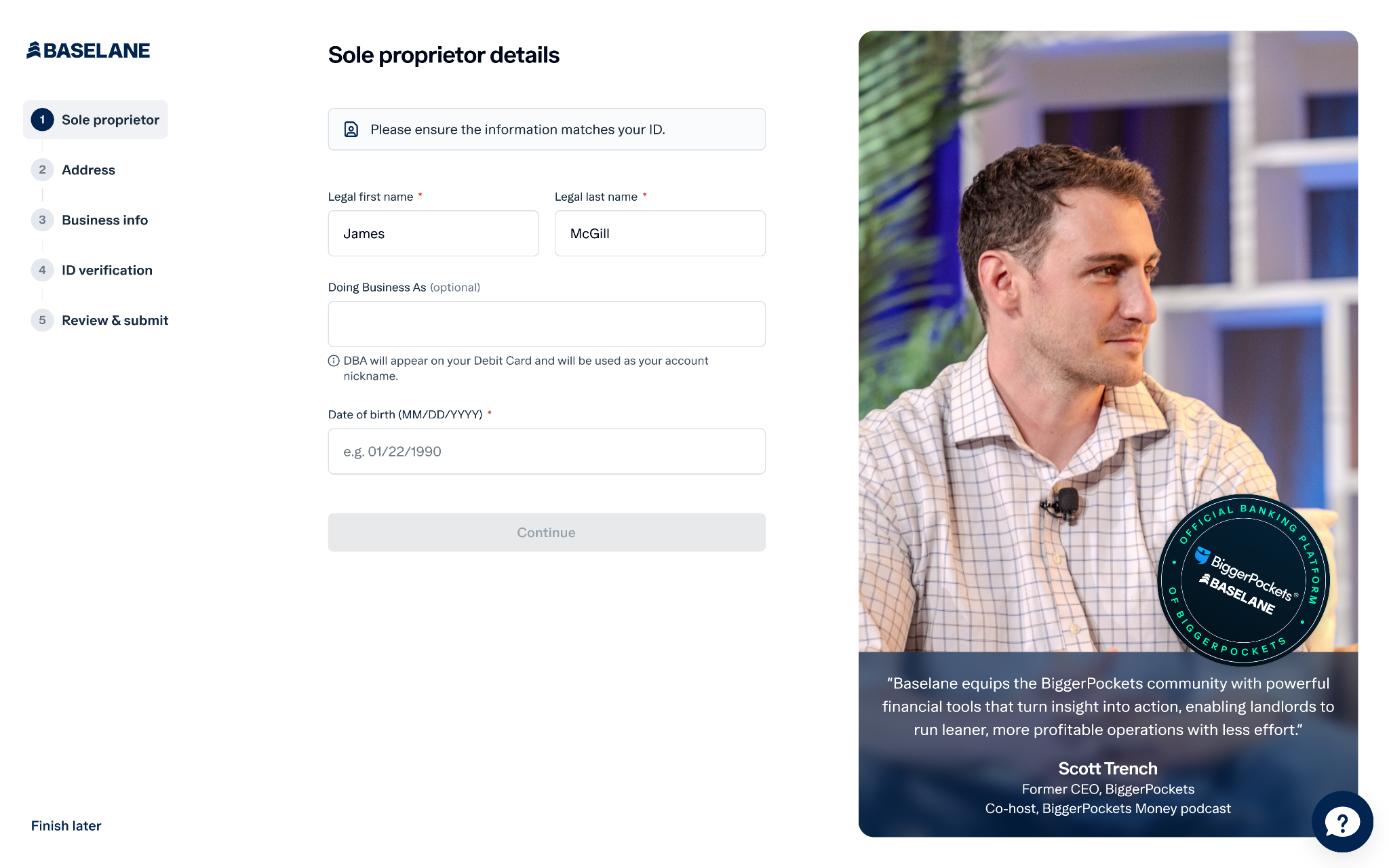
- Review your details and submit. Once your application is approved, you can start adding funds or create sub-accounts for specific purposes, such as one to hold a security deposit, another for paying for a mortgage, and the last one to collect rent payments.
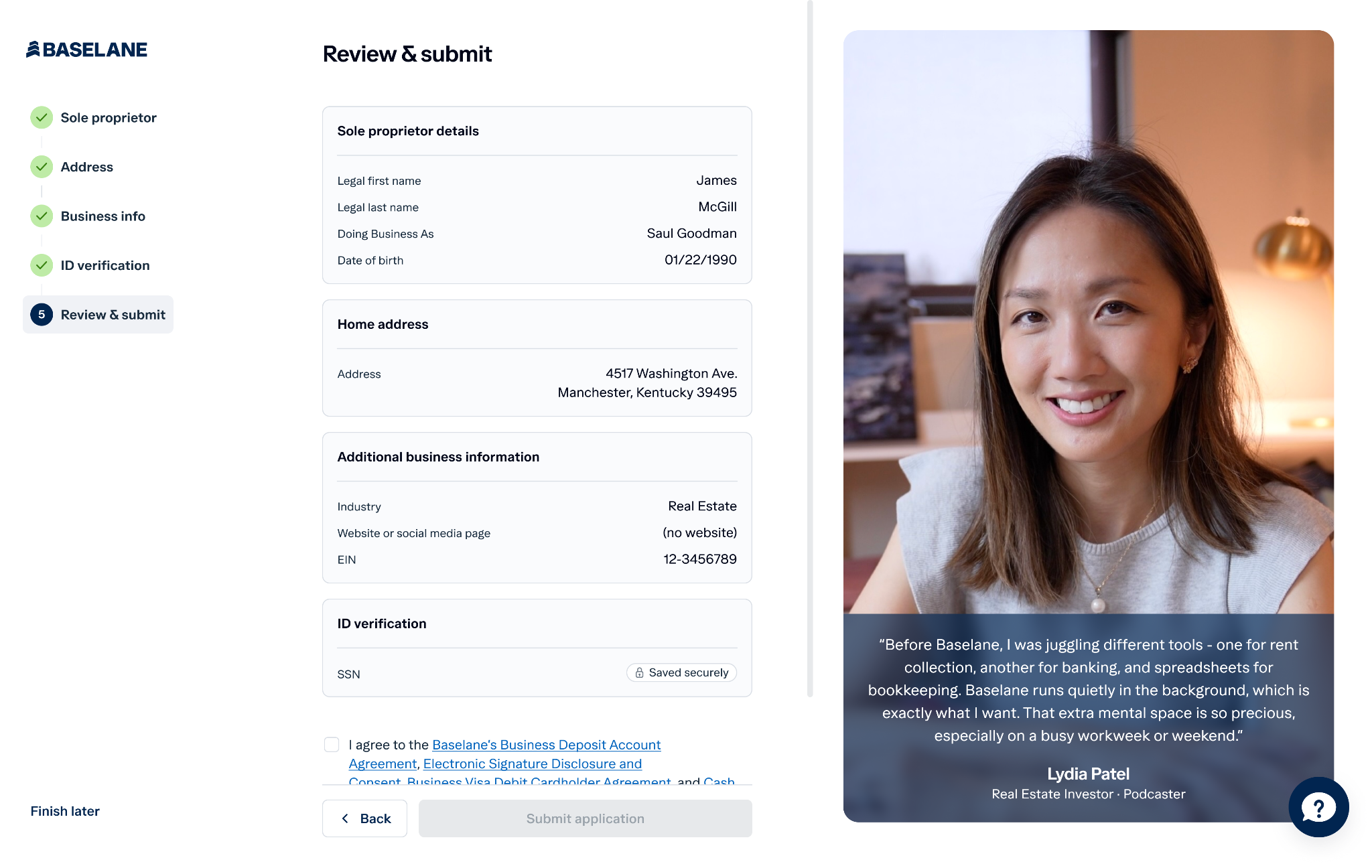
Baselane also automates bookkeeping, as every transaction is auto-tagged to the Schedule E category. You can even add auto-tag rules to categorize each transaction into a specific property. This is super handy when you’re managing more than a handful of units.
I have enjoyed using Baselane to manage my property. The steps to create an account, a lease, add a tenant, and track expenses are easy to follow. I feel confident knowing that I can manage my property and expenses all in one platform. ~ Vanessa
Whether you want to open an Airbnb bank account for your vacation rentals or a sole proprietor business bank account for a single unit, Baselane adjusts to your portfolio’s needs. Explore more business bank accounts for a vacation rental home.
Run your rentals like a pro
Opening a business bank account for your sole proprietorship is one of the easiest ways to simplify management of rental income. Separate accounts mean better organization, simpler taxes, and a clear view of your rental business.
Baselane gives you all the banking features you need to manage multiple properties, collect rent, and maintain clear books—all without the hassles of traditional banks. Start separating your personal and rental finances with Baselane!
FAQs
Do I need a sole proprietor business account for rental income?
While not legally required, it’s best to open a dedicated sole proprietorship business account to keep your finances organized, simplify taxes, and protect your personal funds.
Can I use my personal bank account for rental income?
You can, but it makes bookkeeping harder and can cause issues at tax time. Read more about business checking account vs. personal in our in-depth guide.
What documents do I need to open a sole proprietorship bank account for my rental properties?
For a sole proprietorship in real estate, you need your ID, business info, SSN/EIN, DBA documents (if applicable), and proof of address. Optional: business license or lease agreements.
Can a sole proprietor landlord have multiple business bank accounts?
Yes. Many landlords create sub-accounts for each property to keep finances separate. Separate accounts also make rental income tracking easier.
What is the best bank account for sole proprietorship landlords?
You can either choose from one of the best banks for real estate investors or go with digital landlord rental management software like Baselane. A digital banking platform offers much more flexibility and scalability compared to traditional banks.
How long does it take to open a business bank account?
Typically the process of opening a landlord bank account is online and takes less than a few minutes to apply. Depending upon the institute or platform, the approval window usually takes 1–3 business days.
Do I need an EIN to open a sole proprietorship account?
Not always. You can use your SSN, but an EIN is recommended if you prefer not to use personal info for business.
















.jpg)
